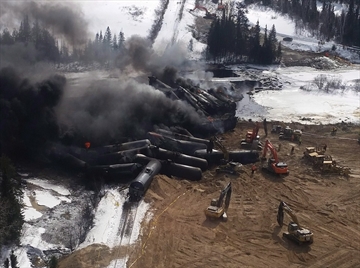Repost from SeattlePI.com
State House bill: Report volume, contents of oil trains
By Joel Connelly, April 14, 2015A bill that would require “comprehensive reporting” of the volume and specific contents of oil trains crossing Washington was passed on a bipartisan vote by the state House of Representatives on Tuesday.

The legislation goes to the Republican-run state Senate, where key committee chairs enjoy much closer relationships with railroads and oil refiners.
“The House has passed these urgently needed policies with bipartisan support, twice. Delay on the part of the Senate is unacceptable,” said Joan Crooks, CEO of the Washington Environmental Council and Washington Conservation Voters.
(Washington Conservation Voters tried in 2014 to defeat several oil industry allies in the Senate, but lost every high-profile race.)
The legislation, passed on a 58-40 vote, requires that shippers and receivers give cargo data to first responders, but goes further and establishes a website for members of the public to access the information.
Washington Fire Chiefs, in letters sent last month to railroads, asked BNSF, Union Pacific and Canadian National to supply “Comprehensive Emergency Response Plans” and “Worst Case Scenarios” on an oil train accident.
BNSF has responded by offering the chiefs a meeting.
If there is such a response plan or plans, “I haven’t seen it,” new Seattle Fire Chief Harold Skoggins told a news conference with Sen. Maria Cantwell and Seattle Mayor Ed Murray last week.
“It would be nice were there a system created where we would be notified when this material is traveling through our city,” Skoggins added.
The railroads have been reticent about releasing cargo information, citing national security concerns and privately voicing fear of protests.

BNSF has, however, released information on the upgrading of tracks and investment in newer, safer oil tanker cars.
The House legislation goes further, directing rule making for such measures as tug escorts when hazardous cargoes are transported by water. It directs the state to inspect rail crossings and push for repairs.
And it would require oil companies to pay for increased oil spill prevention, preparedness and response.
Just two and a half years have passed since the first oil train, carrying Bakken crude oil from North Dakota, passed through Seattle en route to refineries in northern Puget Sound.
The state now sees about 19 oil trains a week. At least a dozen pass along the Seattle waterfront, through a mile-long tunnel, and past the stadium homes of the Seattle Seahawks, Seattle Mariners and Seattle Sounders.
The BNSF has trained Seattle firefighters on oil tanker cars brought to a site in Interbay. But any serious fire would require a major response from numerous fire departments.
The legislation in Olympia has been inspired, in part, by the long delay in getting new oil train safety rules — such as getting old, unsafe tanker cars off the tracks — out of the U.S. Department of Transportation.
The U.S. and Canada have seen a series of oil train fires in recent months. A runaway train wiped out the center of Lac-Megantic, Quebec, killing 47 people. A train blew up near New Casselton, North Dakota, luckily in an unpopulated area. In February, there were major accidents and fires in West Virginia, Illinois and Ontario.
Sen. Cantwell is sponsoring federal legislation that would require railroads and oil companies to disclose routes and vapor content of trains to first responders.
Eventually, the senator warned last week, Puget Sound population centers could see up to 16 trains a day.


You must be logged in to post a comment.